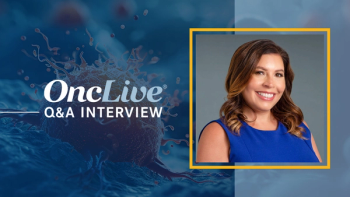
Immunotherapy Could Represent New Treatment Avenue in T-Cell Lymphoma
The investigation of treatments harnessing the immune system in patients with T-cell lymphoma could lead to "a new era" of therapy for this patient population.
The investigation of treatments harnessing the immune system in patients with T-cell lymphoma could lead to "a new era" of therapy for this patient population, according to Stefan K. Barta, MD, MS.
In a presentation at the
“Most of our experience with T-cell lymphoma has been with therapies that target PD-1 and PD-L1 inhibitors, and several clinical trials have been performed evaluating single agents,” Barta, leader, T-Cell Lymphoma Program, Abramson Cancer Center, University of Pennsylvania in Philadelphia, said. “We have seen modest responses that may depend on the [T-cell lymphoma] subtypes,” Barta added.
Phagocytosis is another way the immune system controls cancer, primarily through macrophage activity and controlled by the promacrophage signal, “EAT ME,” and the antiphagocytic signal, “DON’T EAT ME.”2
Treatments that target surface antigens in T-cell lymphomas include monoclonal antibodies, antibody-drug conjugates (ADCs), and recombinant fusion proteins. Among monoclonal antibodies, agents that have been evaluated include mogamulizumab-kpkc (Poteligeo), alemtuzumab (Campath), isatuximab-irfc (Sarclisa), daratumumab (Darazlex), and lactam. The ADCs brentuximab vedotin (Adcetris) and the fusion protein denileukin diftitox-cxdl (Lymphir) have also been evaluated.
Turning to chimeric antigen receptor (CAR) T-cell therapy, “though promising, especially in B-cell lymphomas,” Barta said, “the approach does have its challenges in T-cell lymphomas, primarily because the antigens that are being targeted are also shared by normal T cells.”
Cancer cells that share the same antigen can cause CAR T cells to attack each other and normal T cells, resulting in CAR T-cell fratricide and T-cell aplasia.3 Another challenge with the manufacture of CAR T cells is reduced expansion and exhausting the T cells, resulting in a less effective product. “There is also the theoretical concern about contamination, and this can result in CAR T cells developing chemoresistance or becoming immunotherapy resistant,” Barta said.
There are several strategies to address these challenges. “One option is to reduce the expression of the antigen that you're targeting on the CAR T cells, and that can be done, for example, by protein expression blockers that inhibit the trafficking of the antigen to the cell surface,” Barta said.
Another option is to knock out the gene that is responsible for expression of the antigen. Switches can be introduced to turn on or turn off the gene expression. “For example, you can switch off the antigen expression during manufacturing and then, so that fratricide does not occur, switch it back on,” Barta continued.
Another option is to select T cells that do not express the antigen that is being targeted. “CD7 is not expressed in about 90% of normal T cells, and those can be selected to then introduce the CAR among those that are negative on the antigen,” Barta said.
Several studies have explored these strategies. CD30 is a transmembrane glycoprotein belonging to the tumor necrosis factor receptor superfamily. Ramos et al,4 conducted a phase I dose-escalation study in which 9 patients with relapsed/refractory Hodgkin lymphoma or anaplastic large cell lymphoma were infused with autologous T cells that were gene-modified with a retroviral vector to express the CD30-specific CAR. Further, Lu et al,5 demonstrated that naturally selected 7CAR (NS7CAR) T cells from bulk T cells were able to overcome major fratricide by minimizing accessible CD7 epitopes.5
Another notable target is CD70. For example, Barta highlighted an allogeneic product that disrupts expression to prevent any graft-vs-host effect that has promising results shown in the COBALT-LYM trial (NCT04502446), an open-label, multicenter, global study evaluating the safety and efficacy of CTX130.6
Another trial that evaluated the TRBC1-directed CAR T-cell therapy was the phase 1/2 LibrA T1 study (NCT03590574), which has demonstrated the ability to produce responses among patients with relapsed/refractory peripheral T-cell lymphoma.7
“We are excited to see these come to fruition,” Barta said.
T-cell malignancies have been associated with poor prognosis, “but leveraging the immune system has led to significant improvements in outcomes. The administration of cellular therapy has ushered in a new era for approaches in T-cell lymphoma,” Barta concluded.
References
- Barta SK. The Promise of Immunotherapies in T-Cell Lymphoma. Presented at: 12th Annual Meeting of the Society of Hematologic Oncology (SOHO 2024). September 4-7, 2024. Houston, TX.
- Kelley SM, Ravichandran KS. Putting the brakes on phagocytosis: "don't-eat-me" signaling in physiology and disease. EMBO Rep. 2021;22(6):e52564. doi:10.15252/embr.202152564
- Ren A, Tong X, Xu N, Zhang T, Zhou F, Zhu H. CAR T-cell immunotherapy treating T-ALL: challenges and opportunities. Vaccines (Basel). 2023;11(1):165. doi:10.3390/vaccines11010165
- Ramos CA, Ballard B, Zhang H, et al. Clinical and immunological responses after CD30-specific chimeric antigen receptor-redirected lymphocytes. J Clin Invest. 2017;127(9):3462-3471. doi:10.1172/JCI94306
- Lu P, Liu Y, Yang J, et al. Naturally selected CD7 CAR-T therapy without genetic manipulations for T-ALL/LBL: first-in-human phase 1 clinical trial. Blood. 2022;140(4):321–334. doi:10.1182/blood.2021014498
- Iyer SP, Sica RA, Ho PJ, et al. The COBALT-LYM study of CTX130: a phase 1 dose escalation study of CD70-targeted allogeneic CRISPR-Cas9–engineered CAR T cells in patients with relapsed/refractory (R/R) T-cell malignancies. HemaSphere. 2022;6:163-164. doi: 10.1097/01.HS9.0000843940.96598.e2
- Autolus Therapeutics presents positive results from AUTO4 in relapsed/refractory TRBC1-positive peripheral T-cell lymphoma. News release. Autolus Therapeutics plc. June 16, 2023. Accessed September 4, 2024. https://autolus.gcs-web.com/news-releases/news-release-details/autolus-therapeutics-presents-positive-results-auto4


































